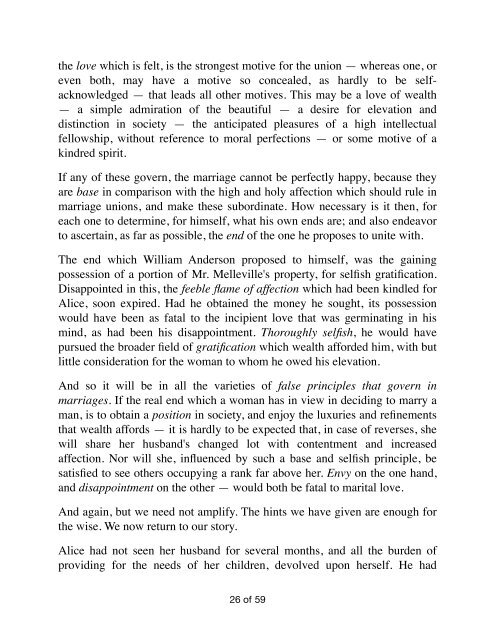The Prodigal Daughter
Character building stories by Timothy Shay Arthur (June 6, 1809 – March 6, 1885) Timothy Shay Arthur has done more for American literature than any one other person. His name will be remembered and loved, when those of his critics will be forgotten, together with their productions. I doubt if there is another man in the country who has done such a vast, such a measureless amount of good with the pen. There is probably not another American writer who has produced so much, as Arthur." "Arthur was the most popular and widely read author of his times!""All of the books from the pen of Timothy Shay Arthur are most interesting, and of a high moral and useful tone. To read any of them, must improve the character and the conduct. Mr. Arthur's works are all wholesome; they inculcate morality and purify the feelings — by tastefully illustrating the beauties of virtue, and the iniquities of vice. "His works will be read with interest by all the admirers of wholesome novels, and will be seized on with avidity by the thousands of readers who prefer Mr. Arthur's useful and instructive sketches — to the flimsy novels which overstock the market. To Mr. Arthur the public are indebted for a species of composition that while it affords delight, conveys at the same time, many moral and practical lessons for life." (Editor, 1855)
Character building stories by Timothy Shay Arthur (June 6, 1809 – March 6, 1885) Timothy Shay Arthur has done more for American literature than any one other person. His name will be remembered and loved, when those of his critics will be forgotten, together with their productions. I doubt if there is another man in the country who has done such a vast, such a measureless amount of good with the pen. There is probably not another American writer who has produced so much, as Arthur."
"Arthur was the most popular and widely read author of his times!""All of the books from the pen of Timothy Shay Arthur are most interesting, and of a high moral and useful tone. To read any of them, must improve the character and the conduct. Mr. Arthur's works are all wholesome; they inculcate morality and purify the feelings — by tastefully illustrating the beauties of virtue, and the iniquities of vice.
"His works will be read with interest by all the admirers of wholesome novels, and will be seized on with avidity by the thousands of readers who prefer Mr. Arthur's useful and instructive sketches — to the flimsy novels which overstock the market. To Mr. Arthur the public are indebted for a species of composition that while it affords delight, conveys at the same time, many moral and practical lessons for life." (Editor, 1855)
Create successful ePaper yourself
Turn your PDF publications into a flip-book with our unique Google optimized e-Paper software.
the love which is felt, is the strongest motive for the union — whereas one, or<br />
even both, may have a motive so concealed, as hardly to be selfacknowledged<br />
— that leads all other motives. This may be a love of wealth<br />
— a simple admiration of the beautiful — a desire for elevation and<br />
distinction in society — the anticipated pleasures of a high intellectual<br />
fellowship, without reference to moral perfections — or some motive of a<br />
kindred spirit.<br />
If any of these govern, the marriage cannot be perfectly happy, because they<br />
are base in comparison with the high and holy affection which should rule in<br />
marriage unions, and make these subordinate. How necessary is it then, for<br />
each one to determine, for himself, what his own ends are; and also endeavor<br />
to ascertain, as far as possible, the end of the one he proposes to unite with.<br />
<strong>The</strong> end which William Anderson proposed to himself, was the gaining<br />
possession of a portion of Mr. Melleville's property, for selfish gratification.<br />
Disappointed in this, the feeble flame of affection which had been kindled for<br />
Alice, soon expired. Had he obtained the money he sought, its possession<br />
would have been as fatal to the incipient love that was germinating in his<br />
mind, as had been his disappointment. Thoroughly selfish, he would have<br />
pursued the broader field of gratification which wealth afforded him, with but<br />
little consideration for the woman to whom he owed his elevation.<br />
And so it will be in all the varieties of false principles that govern in<br />
marriages. If the real end which a woman has in view in deciding to marry a<br />
man, is to obtain a position in society, and enjoy the luxuries and refinements<br />
that wealth affords — it is hardly to be expected that, in case of reverses, she<br />
will share her husband's changed lot with contentment and increased<br />
affection. Nor will she, influenced by such a base and selfish principle, be<br />
satisfied to see others occupying a rank far above her. Envy on the one hand,<br />
and disappointment on the other — would both be fatal to marital love.<br />
And again, but we need not amplify. <strong>The</strong> hints we have given are enough for<br />
the wise. We now return to our story.<br />
Alice had not seen her husband for several months, and all the burden of<br />
providing for the needs of her children, devolved upon herself. He had<br />
26 of 59

















